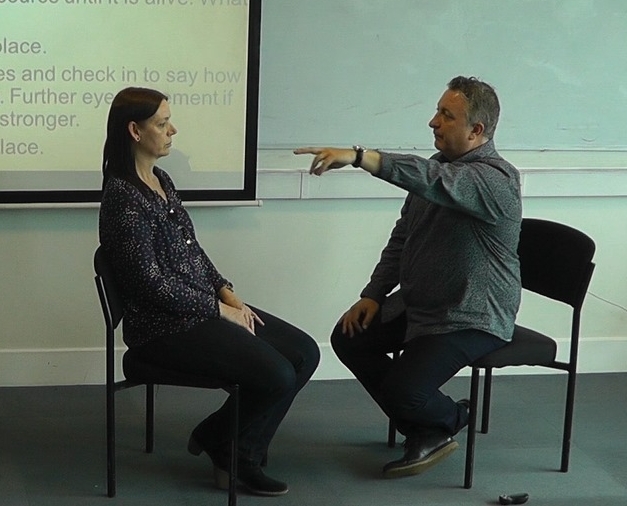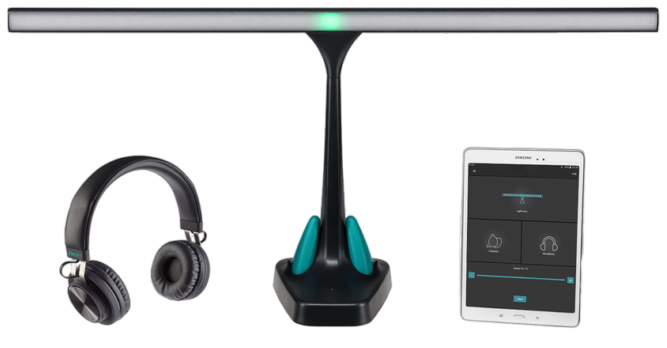What is Eye Movement Desensitisation and Reprocessing?
When a person experiences a trauma, it can become locked within its own memory network, and the sensory experience connected to the trauma can become frozen at that point in time in both the body and mind. There is thus difficulty in processing the trauma, and this leads to a variety of symptoms such as PTSD. This is where EMDR comes in.
EMDR aims, through a protocol of prescribed sequenced steps, to activate a client’s information processing system, and then stimulate the system through bilateral stimuli such as alternating eye movements.
This is designed to stimulate accelerated information processing, and access channels of association. In doing so the trauma can be processed so as to clear out past disturbance through to an adaptive resolution, improving both present and future functioning.
A normal treatment, which is equally effective whether in-person or online, will require a minimum of 6 sessions. At the end of the treatment, whether more sessions are needed or not can be discussed and agreed upon.

“EMDR is a bizarre and wondrous treatment. We found that, of people with adult-onset traumas, a one-time trauma as an adult, that it had the best outcome of any treatment that has been published.”
― Bessel A. van der Kolk

EMDR Online and In Person with Expert Care
EMDR sessions are available through both online sessions and face to face sessions in Colchester. Either medium offers an equally powerful approach to working with trauma, PTSD and other emotionally distressing experiences.
Sessions are available with Dr Tom Barber and Dr Sandra Westland, both of whom bring extensive experience in trauma therapy, with thousands of hours specifically dedicated to helping people with EMDR and running trainings and workshops in EMDR.
They have supported individuals from diverse backgrounds, including those with personal experiences of childhood or adult trauma, as well as professionals such as paramedics, police officers, social care workers, prison staff, and military personnel.
Recognising that each person’s trauma is deeply personal and unique, Tom and Sandra offer compassionate, tailored care to meet your individual needs. Their expertise ensures a safe and effective approach to healing, no matter the complexity of your experience.

Online Sessions
Using EMDR online with the dedicated platform Bilateral Base offers a seamless, secure, and highly effective way to access therapy from the comfort and safety of your own home.
Bilateral Base is specifically designed for EMDR, providing customisable bilateral stimulation through audio, visual, or tactile cues. This ensures the same therapeutic benefits as in-person sessions while maintaining flexibility and convenience.
The platform prioritises privacy and user-friendly features, allowing you to engage in focused, productive sessions with your therapist. Whether you’re seeking trauma recovery or emotional balance, Bilateral Base makes EMDR therapy accessible, efficient, and tailored to your unique needs, from anywhere in the world.

In Person Sessions
Face-to-face EMDR sessions in Colchester provide a personalised, focused environment where you can engage deeply with your therapy.
In our comfortable and private setting, you’ll benefit from the in-person presence of a highly trained therapist, ensuring immediate support and guidance throughout the process.
Being physically present allows for a more connected and intuitive therapeutic experience, where body language and subtle cues can enhance understanding and progress. This hands-on approach creates a safe space for processing trauma, fostering a sense of trust and reassurance. Face-to-face sessions offer a grounded and collaborative path to healing, tailored to your unique needs.
Approved for Funding by Leading Insurers




Research and Recognition of Treatment for Trauma, PTSD, and Complex PTSD
The National Institute for Health and Care Excellence (NICE) recommends EMDR for trauma-focused therapy, which is unsurprising considering the research confirming its efficacy.
Eye movement desensitisation and reprocessing therapy is an empirically validated treatment for trauma and negative life experiences. As of 2014, twenty-four randomised controlled trials support the positive effects of EMDR therapy in the treatment of emotional trauma and other adverse life experiences.
Seven of ten studies report EMDR therapy to be more rapid and/or more effective than trauma-focused cognitive behavioural therapy. Twelve randomised studies of the eye movement component noted rapid decreases in negative emotions and/or vividness of disturbing images, with an additional 8 reporting a variety of other memory effects.
Numerous other evaluations document that EMDR therapy provides relief from a variety of somatic complaints, and an efficient approach to address psychological and physiologic symptoms stemming from adverse life experiences (Shapiro, 2014).

Bilateral Stimulation - The Drving Force of EMDR
Bilateral stimulation (BLS) is a core element of EMDR therapy, involving alternating stimuli like eye movements, sounds, or taps to activate both sides of the brain.
This process mimics the brain’s natural mechanisms during REM sleep, where memories are processed and stored. By engaging in BLS, individuals can reprocess traumatic memories, reducing their emotional intensity and fostering adaptive thinking.
BLS is particularly effective in treating trauma because it facilitates the brain’s natural ability to heal. Studies show that EMDR, incorporating BLS, significantly reduces PTSD symptoms. In fact, up to 84% of individuals with simple PTSD reported symptom improvement after 3–8 EMDR sessions.
Through BLS, EMDR offers a structured, powerful approach to trauma therapy, helping people achieve lasting emotional relief and recovery from distressing experiences.

Using EMDR for Other Presenting Issues
Trauma emanates from devastating and/or ongoing events or experiences that cause somebody to develop faulty beliefs about themselves, and question the world and their being.
Whilst EMDR is primarily used to overcome symptoms associated with post-traumatic stress disorder (PTSD), it has been found to help other mood and anxiety disorders, including depression, phobias, and panic disorder.
A review of published studies on how effective EMDR is for treating trauma-associated symptoms in people with psychosis, bipolar disorder, unipolar depression, anxiety disorders, substance use disorders, and chronic back pain found that EMDR does indeed improve these symptoms.
The review also found evidence that EMDR may even help improve the other, non-traumatic symptoms found in mood disorders and may be useful as an additional treatment for people who have chronic pain. (Star, 2018)
Testimonials
Tom and Sandra have given me the confidence to run my own business for the last four years, and they are both great personalities. I have loved every minute of all that I have received from them. They are highly recommended.
Sandra is probably one of the most gifted and talented therapists in the UK. Genuine, intuitive, and a true natural therapist and trainer.
Tom’s generosity in sharing, his approachable nature, and wealth of experience, make him unique as a teacher, therapist, and human being. If you want to grow I recommend sun, food, water, and Tom.
